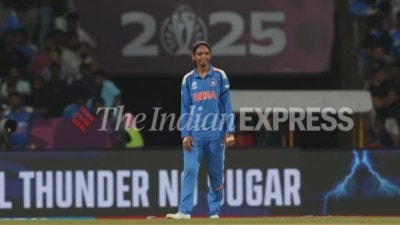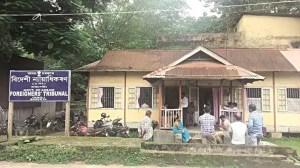The Man with a 23-page CV
As you turn into the driveway of Professor Kaushik Basu,the chief economic adviser to the Ministry of Finance in the Government of India
Far from the gravitas of North Block,Kaushik Basu,the chief economic adviser,collects art on whimsy,paints Marxs beard in oil and maintains an anthropologists diary
As you turn into the driveway of Professor Kaushik Basu,the chief economic adviser to the Ministry of Finance in the Government of India,the first sight to greet you quite belies the stern gravity of his title. Its a white statue,clothed in a brown dhoti and white kurta,standing on the balcony of the first floor,staring impassively through sunglasses with rectangular frames,at the quiet tree-lined lane on Shahjahan Road in Lutyens Delhi.
Is he a warder off of crows? A grim Orwellian statement on the surveillance state? Turns out,hes neither. I tried to buy a mannequin from a shop in Mayur Vihar, says Basu,as I thought itd make for a great sculpture,like the stunning white alabaster statues I saw on a balcony in Oaxaca,and in Siena,Italy. But the shopkeeper was unwilling to part with anything more than the clothes the mannequin wore,so Basu paid a visit to his supplier instead. Thats how he acquired the resident of the balcony,who he regards as lovely as a work of art,with no input from me,except buying this character and carting him over.
There is some artistic whimsy also on display in the living room of Basus residence such as a knock-off of one of Boteros splendidly corpulent women,acquired on a street in Vietnam,and a street-scene by an artist from upstate New York. These are surrounded by contemporary classics,and
one-time bets that appear to have paid off: a sprawling painting of Mother Teresa by Burmese artist Sitt Nyein Aye and a striking piece by an artist from Telengana,Laxman Aelay. A modest distance away,in the study and the dining room,is Basus work: charcoal life-drawings,and diligently copied iconic portraits of a lushly-bearded Marx and a pipe-smoking Russell.
Ever since Basu began his stint at North Block in December 2009,hes been putting his polymathic 23-page CV to good use,proposing inventive solutions to problems some of which are so entrenched theyre institutions unto themselves. Like corruption. Last month,Basu wrote a paper proposing to lift the culpability of the person made to pay a harassment bribe for something owed to them,such as ration rice or an income tax refund. The paper suggested that,should the briber choose to blow the whistle on the corrupt official,the amount could be reimbursed.
The paper made a policy recommendation using game theory,which Basu had previously applied to catching pickpockets or filing a lost baggage claim while travelling Travellers Dilemma,an echo of Prisoners Dilemma,and to inventing an interactive two-person Sudoku,dui-doku. Not everyone appreciated his effort,with reactions ranging from disbelief to outrage,partly due to the medias initial mischaracterisation of the paper as one that proposed the legalisation of bribes. The later responses have been overwhelming, says Basu. Ive had handwritten letters,saying Thank you for not treating me as a criminal when a government officer came to harass me, and a womens group saying,most persuasively,that the law ought to not hold the dowry giver and taker on par. His son,also an economist,pointed out loopholes to plug; weird scenarios in which the strategy could backfire. Basu also found parallels in Scandinavian law,which used similar asymmetries in its treatment of victims and oppressors.
Old bureaucratic cogs may prefer obfuscation to plain-speak,and would be unlikely to use abstract theory to attempt to resolve quotidian problems. But debate is a sport that Basu has mastered in the more open,flattened world of academia,having spent 15 years in the economics department of Cornell University,and 17 years in Delhi School of Economics. Over here,you have to be careful about speech,which troubles me, says Basu. Ive spent my life in academia. Whenever you want to criticise something,you air that. Its not as if the system gags you, he adds. India is in fact freer than some industrialised countries or international organisations like the World Bank and IMF,in terms of having space to float ideas which diverge with the main ideas of these organisations.
The problem,as he sees it,can be attributed to the Babel-like din of vociferous arguments. So many people put their own interpretations to what you say that it effectively places a gag on what you say, he elaborates. The resulting chaos contributes to most politicians mastery of obfuscation. This has made Basu understand,for the first time,the advantages of the shifty side-winders art of sarkari-speech,of saying something that can be interpreted in so many ways,in the end it means very little. My PhD adviser,Amartya Sen,whos certainly been in the public eye,gave me a beautiful piece of advice/warning, says Basu. He said,when you utter a sentence,you must make sure that not just the full sentence sounds right,but that any consecutive subset of words must not give the wrong impression.
Though Basu concedes that his forthrightness still occasionally gets him into trouble,he tries,quite consciously,to maintain distance and perspective. Since he took on the post more than a year ago,hes been maintaining a diary about his experiences,a bit like an anthropologist among the tribes,with him being Malinowski,and North Block,his Trobriand Islands. He is acutely aware that this is a distance hes able to afford himself since he wont be roaming the North Blocks corridors forever. He returns to his post as professor of economics and international studies at Cornell in February next year,and is already starting to fondly reminiscence about his two-year stint. Its been very intense,all-encompassing,I loved it! he says.
Once back in academia,hell have more time to devote to his other pursuits: guzzling books on philosophy,painting,and writing books and plays. While his first and last serious play,Crossings at Benares Junction,was published in the Little Magazine back in 2005,surely his notes would set the stage for a satirical comedy,a bleak bit of Absurd theatre,or a Gogol-style combination of the two? I dont know,Ive already got a couple of ideas that Id love to do,from before I joined government, he says,discreetly sidestepping the suggestion,about Indian bureaucracy in the olden days,when it was worse than it is now,based on my time being shuttled around from one counter to another in bank branches,as a student in DU in the 70s. It can be funny and bizarre. I have lots of notes,and conversation and dialogue written up. Or,maybe just a full play on a seminar taking place so people getting up and speaking,there are interjections
Until then,though,the preoccupations of real-life bureaucracy shall have to suffice.
- 01
- 02
- 03
- 04
- 05































